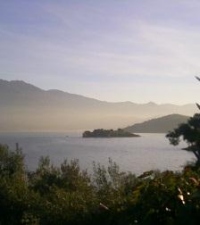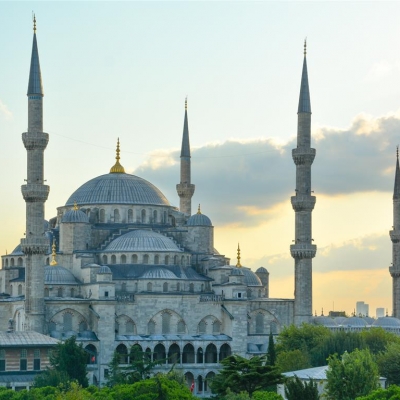Considering a move to Turkey?

The Republic of Turkey (Türkiye Cumhuriyeti) is a vast and diverse land soaked in drama, history, tradition and culture. Increasingly, it’s also the destination of choice for many who want to leave behind their daily grind and go in search of something a little more exotic. In the past, many have been scared off by misconceptions about Turkey’s religious or political status. But, things are changing and they are changing quickly.
Turkey in a nutshell
Modern Turkey is a large Eurasian democratic country situated between southeast Europe and the Middle East. In Europe, Thracian Turkey is bordered by Bulgaria and Greece and in Asia, Anatolian Turkey flirts with its neighbours - Syria, Iran, Iraq, Armenia, Georgia and Azerbaijan. To the north lies the Black Sea, to the west, the Aegean and to the south, the Mediterranean. Turkey’s major cities are glorious Istanbul (old Constantinople), provincial Ankara (the capital) and sunny Izmir. The population of around 75 million makes Turkey the 18th largest per capita nation in the world and the 37th largest by area. Around 50% of the population is under 30 and a common misconception is that Turks are Arabs. This is completely incorrect. Ethnic Turks (as judged by language) are found in Anatolia, the Caucasus and Central Asia. Many Turks in western regions consider themselves to be culturally European.
Turkey has been a secular state since it was founded by Mustafa Kemal (now widely known as Atatürk – father Turk) in 1923 and it practises a moderate and state-supervised form of Islam. A democratic republic with a strong legislative framework, its government is headed by the Prime Minister and there is a well-established multi-party system in place. The President of Turkey, as head of state, holds some substantial reserve powers and legislative control is vested in the Grand National Assembly of Turkey.
Much has been made of Turkey’s application for full membership of the European Union, but regardless of the pros, cons and challenges from other EU nations, there can be no doubt that Turkey is a nation to be reckoned with and an exciting, if sometimes challenging, place to relocate to.
So what’s the attraction?
Climate
The coastal areas of Turkey bordering the Aegean and Mediterranean Seas have a blessed, temperate climate with dry summers and mild to cool, wet winters. Average temperatures range from 9°C in winter to 29°C. Be careful though. It’s not uncommon for extremes at either end of that scale and summers can be blisteringly hot and winters cold and difficult, particularly since many Turkish houses struggle to cope with Mother Nature’s unpredictable mood swings. Elsewhere, things range from relatively mild and benign to bitterly cold and extremely wet. In South-Eastern Anatolia for example, snow is common from November till April and average annual temperatures range from -13°C to 17°C. It’s hardly surprising that most sun-seekers head for the Aegean or Mediterranean regions. In places like Bodrum and Fethiye, unbroken sunshine is virtually guaranteed from May to November.
Cost of Living
While it’s true that the cost of living in Turkey has been rising year on year, it is still possible to pick up property bargains, pay low rents, buy cheap, good quality fresh food and eke out a high-quality, low-cost lifestyle, especially when compared to many European countries and the US. It is still feasible to pick up a new apartment on the South Western coast for under £20,000 (€25,000 or $32,000). There’s a downside though. It’s extremely difficult for an independent non-Turkish person to obtain a work permit and there are stiff penalties (including instant deportation) if the law is flouted. Many foreigners who come to live in Turkey without sponsorship from an employer will end up living off their savings: Turkish banks offer extremely favourable interest rates (around 10% as at June 2012).
Economy
The modern Turkish economy has experienced solid growth in the last ten years and has recently emerged as the 16th largest in the world. The International Monetary Fund estimates that Turkey will have the world’s 13th-largest economy in 2026. This is good news for anyone considering living or investing in Turkey, particularly as Turkish banks are nowadays considered safe and are backed by a whole raft of eminently sensible banking regulations. Turkish banks also have excellent on-line banking systems (many of them in English) and offer attractive investment opportunities.
Healthcare
The last decade has seen the implementation of a sweeping health reform programme in Turkey, aimed at increasing the ratio of private to state health provision and making comprehensive health care available to all. As a result, anyone deciding to relocate to Turkey has a choice of joining the state healthcare system (by making regular contributions) or accessing the growing network of excellent private hospitals and clinics. A growing number of heath tourists are invading Turkey’s shores, attracted by a high quality service and competitive prices.
Low Crime Rates
Turkey is a low crime country; anyone settling there is unlikely to be unduly troubled. As with any country, sensible precautions need to be taken. Don’t flash the cash in crowded places and beware of pickpockets. Ladies, please remember that, although Turkey is proud of its secular tradition, the overwhelming majority of people are Muslim and many are conservative. Be respectful. No-one will expect you to dress head-to-toe in poly-cotton sheets, but away from the coastal resorts and city centres of Istanbul, Ankara and Izmir, women are expected to dress modestly.
History and Culture
Türkiye means ‘land of the strong’, an old Turkic/Arabic compound. Anatolia translates as ‘sunrise’ from ancient Greek. Both poetic epitaphs are fitting depictions of a vast land blessed with striking physical beauty, wrought by the brutal force of Mother Nature, and fought over, won and lost by invaders across all of recorded time. The history of Turkey stretches back across the millennia. The Hittites, ancient Greeks, Romans, Byzantines and, most recently, the Ottomans have left a rich and varied legacy. With such an immense political and cultural heritage, it’s not surprising that there are more ancient sites in Turkey than in all of Western Europe: an absolute treasure trove for anyone interested in antiquity. Nor is it surprising that Turkey has developed as a stimulating cultural melting pot. Its people, cuisine, traditions arts, language and general outlook are like nowhere else.
Small Steps
Moving to any foreign land throws up a host of practical and cultural issues but with the right advice, a guiding hand and lots of patience, relocating to Turkey can be a hugely rewarding experience. Take advice from those who have already made the leap. Go visit, try the place on for size first and have an open mind. You may be pleasantly surprised.
Jack Scott
Author of the book named Perking the Pansies, Jack and Liam move to Turkey, a bitter-sweet tragi-comedy recalling the first year of a gay couple in a Muslim land.
- My Life Abroad -
A selection of expat stories

"A fun compulsive read!"
J. Matcham, Amazon
"I strongly advise people ready to live abroad to read this book!"
Patrice, Amazon


 Hiring packing services reduces the stress of moving
Hiring packing services reduces the stress of moving Relocation Services - Which Option is Best?
Relocation Services - Which Option is Best? 5 easy loopholes for wrapping and protecting fragile items
5 easy loopholes for wrapping and protecting fragile items
 AGS Worldwide Movers
AGS Worldwide Movers 1stMove Car Shipping
1stMove Car Shipping Highlights of Istanbul
Highlights of Istanbul